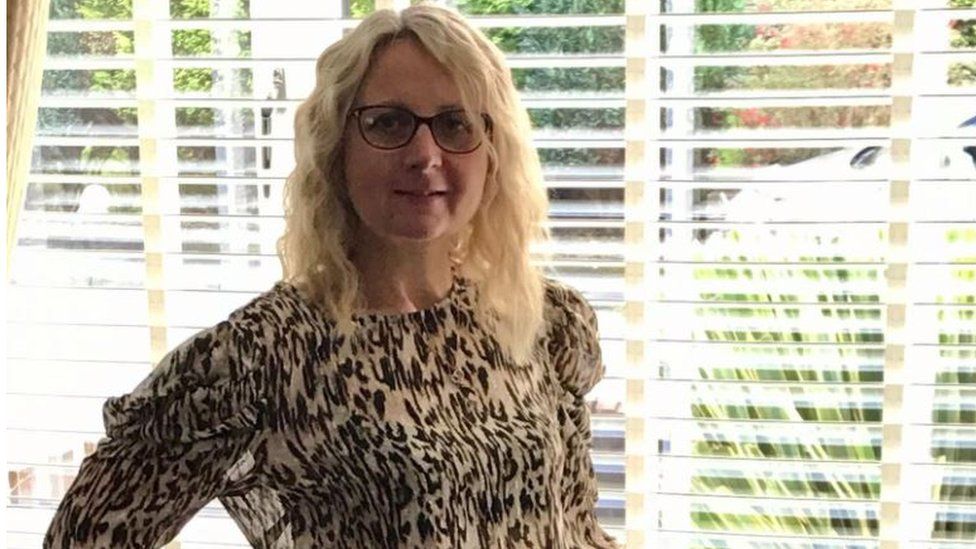'I was asked how often I use the toilet'
- Published

Janet Aspin thought it would be difficult entering the jobs market after 25 years at one company.
But she didn't expect that she would have to tell her new employers how often she needed the toilet.
The 40-year-old, from Darwen in Lancashire, has multiple sclerosis.
She said as soon as her disability was discussed, it became less about what she could do and more about what she couldn't do.
'Never felt so low'
Janet is now running her own successful personal assistant business.
But she was recently let down by a prospective employer who couldn't understand her disability or how to make reasonable adjustments so she could do her job.
Janet was made redundant during the pandemic. She said being back in the job market, with a disability, was difficult.
"I have never felt so low," she said. "I applied for a job, got it, but was then told that I would have to do a load of risk assessments because of my disability.
"At one point they wanted to know how many steps I could take and how many times a day I used the toilet.
"It knocked my confidence, you just feel like a failure. I was good enough to get the job, but then all of a sudden, because of my disability, there is this massive barrier."
According to a group of MPs, the government is failing to remove those barriers.
Employment gap
The Work and Pensions Committee said the government's work programme needs a "radical overhaul".
MPs heard evidence from charities, disabled people's organisations, and ministers from the Department for Work and Pensions (DWP).
Its remit was to look at the disability employment gap. Currently there are just over 50% of disabled people in work, compared to 81% of non-disabled people.
It said the current target of helping one million more disabled into work by 2027 should be scrapped and a different target introduced - halving the disability employment gap.
The chair of the committee, Labour MP Stephen Timms, said: "The gap between the proportion of disabled and non-disabled people in work has remained stubbornly high for years.
"The current overly centralised model of support simply isn't working. We need a radical new localised approach."
The committee also heard evidence of the difficulties disabled people face when looking for support through Jobcentre Plus, such as a lack of interpreters or buildings being inaccessible.
Katie Cheval managed to enter the Jobcentre Plus building but didn't get much further. The 30-year-old, from Kent, said advisors told her she had too many disabilities to successfully find work.
She has mobility issues, fibromyalgia and learning disabilities.
Despite the lack of success through her local job centre, she is currently in work, but has felt discriminated against because of her disability throughout her career.
In her current role, as an assistant manager in a charity shop, she has had to clear out the disabled toilet and is still waiting for a chair she can use behind the till.
She said: "Employers see the physical disabilities first. When I applied for one job I went in for interview and I was immediately asked, "Why are you using a crutch"?
"It just makes me feel like I'm not worth anything, and that my disability becomes a huge barrier. I am able, and I am proud to be disabled."
The Committee found:
- Work capability assessments causing stress and anxiety and pushing claimants further from the labour market
- Disability Confident, hailed as a flagship programme by the DWP, was described by many as a tick box exercise. The government acknowledged that it was not possible to know whether it was any measurable impact on increasing the number of disabled people in work.
- Disabled people were more likely to be working in sectors that were forced to close during the pandemic, more likely to be at risk of redundancy, and more likely to be working reduced hours than non-disabled people.
- Employers not having enough support from the DWP to successfully employ disabled people and in some cases they were either unaware of their legal obligations or were purposefully breaching the Equality Act 2010.
Mr Timms also criticised the government's recent National Disability Strategy for a lack of ambition around getting disabled people into work, saying it was a "major disappointment".
"We had hoped it would chart a course to a more ambitious and stretching target. But, despite the minister's assurances, there is no new target - nor even a consultation on one."
A spokesperson defended the government's record on getting disabled people into work, saying the latest figures on the disability employment gap showed that it had narrowed.
The government is committed to reducing it further by seeing one million more people in work by 2027, the spokesperson said, adding:
"Through our inclusive multi-billion-pound Plan for Jobs we are helping more disabled jobseekers to find, retain and progress in fulfilling work, offering specialist programmes, paired with personal support from our work coaches and disability employment advisers."
- Published28 July 2021
- Published30 June 2021